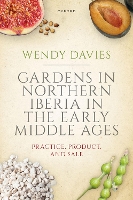


|
|
|
books
| book details |
Gardens in Northern Iberia in the Early Middle Ages: Practice, Product, and Sale
By (author) Wendy Davies

|
| on special |
normal price: R 4 892.95
Price: R 4 647.95
|
| book description |
Using archaeological, archaeobotanical, and written evidence, this book explores what gardens meant in northern Spain and northern Portugal in the early middle ages - a question asked here for the first time. Dealing with a vast area of the Iberian peninsula that lay beyond Muslim al-Andalus, with great geographical diversity and wide variation in climate, this books spans the sixth to tenth centuries, showing that gardens might lie beside houses or scattered among arable fields or grouped together in garden zones. Gardens are difficult to recognize archaeologically but excavation suggests that many were terraces, as it also suggests that indicators of intensive use - through fertilization or irrigation or characteristic weed species - may be more useful for identifying garden activity than looking for a distinctive shape. The strongest indications of garden produce are that fruit was always important and so were legumes; and some gardens, especially those owned by monasteries, may have grown herbs. The most striking trend across the tenth century is that peasants sold gardens to monasteries, although there are regional differences, Catalonia having a more diverse land market. Peasants sold in order to get food and monasteries bought partly to provide garden produce, including herbs, for expanding communities but partly to use and increase garden space for textile plants--flax, hemp, and dye plants--for commercial reasons, especially urban supply. Gardens were vital for the supply of clothes. By scrutinising the logistics of small- and medium-scale ownership, the relations of owners with large-scale land-holders, especially institutions, and the ins-and-outs of those economic and social interactions, this wide-ranging book adds a new dimension to the environmental history of western Europe, in addition to contributing to an understanding of the social, economic, and cultural history of the period more generally.
| product details |

Normally shipped |
Publisher | Oxford University Press
Published date | 19 Dec 2024
Language |
Format | Hardback
Pages | 240
Dimensions | 240 x 162 x 20mm (L x W x H)
Weight | 548g
ISBN | 978-0-1988-9584-8
Readership Age |
BISAC | gardening / essays
| other options |

Normally shipped |
Readership Age |
Normal Price | R 5 657.95
Price | R 5 374.95
| on special |
|
|
|
To view the items in your trolley please sign in.
| sign in |
|
|
|
| specials |
|
Look around you is anything real or normal any more? News, images and videos created by AI are everywhere.
|
|
|
This first comprehensive biography of Cecil Rhodes in a generation illuminates Rhodes’s vision for the expansion of imperialism in southern Africa, connecting politics and industry to internal development, and examines how this fueled a lasting, white-dominated colonial society.
|
|
|
|